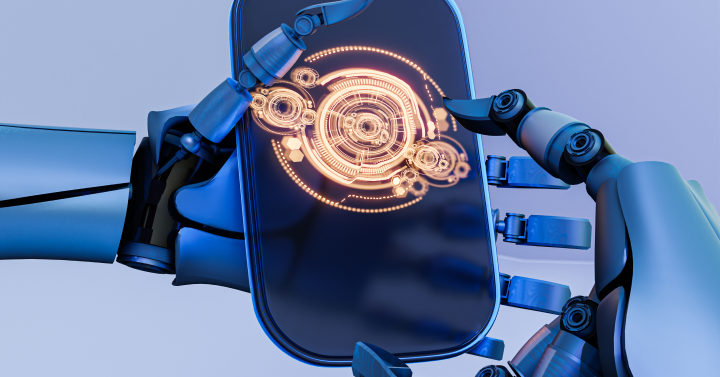Artificial Intelligence (AI) integration into custom software development is becoming more than simply a trend in the rapidly changing world of technology. As businesses strive to stay competitive and meet the growing demands of their users, leveraging AI has emerged as a powerful way to take your business to new heights. Custom software development stands as the best tool that offers tailored solutions to address unique business needs and challenges. However, the complexity of modern software development demands more than just conventional approaches. Enter Artificial Intelligence—a transformative tool that empowers developers to create smarter, more efficient, and adaptive software solutions. Here is a guide that outlines the applications, advantages, and role of artificial intelligence (AI) in custom software development.

We build digital products to help businesses succeed!
AI’s Impact on Development: Shaping Custom Solutions
AI’s impact on development is profound, shaping custom solutions in various ways:
- Enhanced Efficiency: AI streamlines development processes by automating repetitive tasks, reducing the time and effort required to build custom solutions. Tasks such as code generation, testing, and deployment can be automated, allowing developers to focus on more complex aspects of the project.
- Improved Decision Making: AI provides developers with powerful analytical tools to make data-driven decisions. By analyzing large datasets, AI algorithms can identify patterns, trends, and insights that inform the development process, leading to more informed decision-making and better outcomes.
- Personalization: AI enables the creation of highly personalized custom solutions tailored to the specific needs and preferences of users. By analyzing user data and behavior, AI algorithms can customize user interfaces, content recommendations, and interactions, enhancing the overall user experience.
- Predictive Capabilities: AI equips custom solutions with predictive capabilities, allowing them to anticipate user needs and behavior. By analyzing historical data, AI algorithms can forecast future trends and events, enabling developers to proactively address potential issues and optimize performance.
- Adaptability: AI-powered personalized intelligence software are inherently adaptable, capable of learning and evolving over time. Through techniques like machine learning and reinforcement learning, AI algorithms can adapt to changing circumstances, improving performance and effectiveness in real-world environments.
- Automation of Complex Tasks: AI automates complex tasks that were previously difficult or impossible to accomplish using traditional programming techniques. Tasks such as natural language processing, image recognition, and anomaly detection can be automated with AI, enabling developers to build more sophisticated custom solutions.
- Facilitation of Innovation: AI fosters innovation by enabling developers to explore new ideas and concepts. By providing powerful tools and frameworks for experimentation and exploration, AI encourages developers to push the boundaries of what is possible, leading to the development of novel and innovative custom solutions.

AI for Enhanced Analysis: What’s the Pros?
- Fraud Detection: AI algorithms are used in cybersecurity to spot unusual activity that can point to possible security flaws or attacks. Similarly, in industries like finance and healthcare, AI-powered systems can detect fraudulent transactions or anomalous medical conditions with high accuracy, enabling timely intervention and mitigation.
- Improved Predictive Analytics: AI enables more accurate predictive analytics by leveraging advanced machine learning models. By analyzing historical data and identifying complex patterns, AI algorithms can forecast future trends and outcomes with greater precision.
- Enhanced Data Interpretation: AI enhances data interpretation by extracting meaningful insights from unstructured data sources such as text, images, and videos. Natural language processing (NLP) algorithms, for example, can analyze text data from customer reviews or social media posts to derive sentiment analysis or extract key information.
- Real-time Monitoring and Analysis: AI enables real-time monitoring and analysis of data streams, facilitating proactive decision-making and intervention. In industries like manufacturing and logistics, AI-driven systems monitor sensor data to detect equipment failures or optimize production processes in real-time, minimizing downtime and maximizing efficiency.
- Custom Analytics Detection: AI allows for the development of customized analytics solutions tailored to specific business needs and objectives. By leveraging machine learning techniques, organizations can train AI models to analyze data in accordance with domain-specific requirements, uncovering insights and trends that traditional analytics tools may overlook.
Future Directions in AI Development: What Will be The Emerging Trends?
The potential of AI is vast, and its evolution continues to reshape our world. Exciting developments lie ahead, including advancements in natural language understanding, computer vision, reinforcement learning, and AI-driven automation. Ahead are some exciting discoveries in the fields of computer vision, reinforcement learning, natural language comprehension, and AI-driven automation. With the advent of Artificial Intelligence (AI), custom software development has been revolutionized, opening up new opportunities and transforming the way businesses approach software solutions.
- Continued Advancements in Deep Learning: Deep learning and custom artificial intelligence particularly remains at the forefront of AI research and development. Future advancements in deep learning techniques, such as novel network architectures, optimization algorithms, and training methodologies, will lead to improved performance and scalability across various applications.
- Privacy-Preserving AI: AI models to be trained across decentralized devices while preserving data privacy. This approach enables organizations to leverage data from multiple sources without sharing sensitive information, leading to more robust and privacy-preserving AI solutions.
- AI Ethics and Responsible AI Development: As AI technologies continue to impact society in profound ways, there is a growing emphasis on ethical considerations and responsible AI development practices. Future directions in AI development will prioritize ethical principles such as fairness, transparency, accountability, and inclusivity to ensure that AI benefits society as a whole while minimizing potential harms.
- Multimodal AI and Cross-modal Learning: Multimodal AI involves processing and understanding information from multiple modalities such as text, images, and audio. Cross-modal learning techniques enable AI systems to learn from data across different modalities, leading to more comprehensive and holistic understanding of the world.
Conclusion
Artificial intelligence is becoming a crucial component of custom software development, transforming the market and opening up new avenues. Businesses may develop customized software solutions that streamline workflows, improve user experiences, and spur innovation by utilizing AI-powered automation, natural language processing, machine learning, computer vision, and intelligent decision-making. Using AI in custom software development calls for a proper strategy that considers data quality, ethical considerations, and skill requirements. AI’s contribution to custom software creation will grow as it develops further, helping companies to remain competitive in the ever shifting digital market.
All you need to do now is pick a partner who can best incorporate this into your company. You won’t have to worry about AI solutions for your company, thanks to Primathon’s team of IITians and industry-exclusive products. Let’s get in touch today!
Offices
India
86P, 4th Floor, Sector 44, Gurugram, Haryana 122003Singapore
#21-02, Tower 2A, The Bayshore condo, Singapore 469974Canada
8 Hillcrest Avenue Toronto ON M2N 6Y6, CanadaUS
31 River CT, Jersey City, New JerseySubscribe to our newsletter
Our Services
Top Reads
India
86P, 4th Floor, Sector 44, Gurugram, Haryana 122003
Singapore
#21-02, Tower 2A, The Bayshore condo, Singapore 469974
Canada
8 Hillcrest Avenue Toronto ON M2N 6Y6, Canada
US
31 River CT, Jersey City, New Jersey
Contact us
info@primathon.in
+91-9205966678
Reviews


